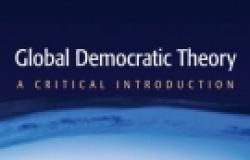Book Review: Global Democratic Theory: A Critical Introduction

Global Democratic Theory: A Critical Introduction by Daniel Bray and Steven Slaughter. Cambridge: Polity Press, 2015. 272 pp, £55 hardcover 978-0-7456-8087-3, £16.99 paperback 978-0-7456-8088-0, £15.99 e-book 978-0-7456-9148-0
On the 23rd of June, 2016, the United Kingdom went to the polls to vote on the now (in)famous ‘Brexit’ referendum. Narrowly, by a margin of 51.9% to 48.1%, the Leave camp emerged victorious over Remain, as voters opted to rescind membership in the European Union (EU), instead of staying in the most advanced transnational political and economic project of all time. Although many arguments were thrown around by both camps, a common trope – levelled consistently by the Leave group – is that the EU undercuts the UK’s sovereignty. Continual transfer of authority to the EU, combined with the free movement of people and an overly-bureaucratic Commission, inhibits the UK from protecting its national interests. In other words, the sidelining of UK citizens by the machinations of the EU tore away at national democracy and fostered a democratic deficit.
It is not the right place to debate whether this argument is right or wrong. But what is clear is that Daniel Bray and Steven Slaughter’s excellent new book – Global Democratic Theory: A Critical Introduction – provides a sophisticated yet eminently readable toolkit to think about how globalization impacts on the nation-state and its ability to maintain democratic control within territorially-defined boundaries. And one doesn’t need to look just at Brexit to understand the importance of this book: the rise of transnational networks, the authority of international organizations (IOs), and increased economic interdependence between nations all speak to the need for a corpus documenting how democratic theory has responded to the challenges posed by the globalization of social, economic, and political forces.
In doing so, the book is divided into seven chapters plus an introduction and a conclusion. The introduction and first two chapters are essentially stage-setting: detailing the structure of the book; elucidating how globalization has led to charges of a democratic deficit in which citizens are removed from sites of decision-making beyond the state: and highlighting the role of global governance bodies and transnational civil society in propagating and responding to this democratic deficit.
Chapters three through to seven then do the bulk of the analytical work. The book’s main goal is to outline how five different strands of global democratic theory – Liberal Intergovernmentalism (chp. 3), Cosmopolitan Democracy (chp. 4), Deliberative Democracy (chp. 5), Social Democracy (chp. 6), and Radical Democracy (chp. 7) – understand the problem of a democratic deficit, and prescribe ways to ameliorate the problem and whether the proposals are themselves feasible. The conclusion provides a typology of these perspectives and outlines the possibility of global democratic theory moving forward.
The authors suggest that each strand recognizes that democracy needs to be reconfigured in light of globalization. The Liberal Intergovernmentalist approach is based on an ethic of reform, in which IOs should be made more accountable and transparent to national governments. The Cosmopolitan view is an ethic of humanity, in which supranational structures are established to give citizens voice in formal bodies beyond the state. An ethics of dialogue undergirds the Deliberative approach in which rational argumentation, especially emanating from civil society, influences decisions taken in IOs and other international arenas. The Social Democratic ethic of equality requires the nation-state to regulate global capital to ensure class divides do not undermine democratic agency. Finally an ethics of revolution underpins the Radical approach in which communities overthrow sovereignty and capitalism and form self-governing entities based on love and compassion, not property rights and self-interest.
Bray and Slaughter do an excellent job categorizing these positions and fleshing out the key literature in each approach. There are, however, a few limitations to the book which bear discussion.
First, as the authors acknowledge in the conclusion, it is very difficult to draw hard-and-fast distinctions between each strand of global democratic thought. Several scholars in the deliberative camp are also cosmopolitans (such as James Bohman), and the radical stream of the Social Democratic view (notably pushed by Alex Callinicos) surely comes close to the Radical view of Hardt and Negri. Moreover the ‘ethics of equality’ upon which the Social Democracy strand is predicated seems like more of a general democratic condition that unpins liberal, cosmopolitan, deliberative, and arguably radical approaches, too. Relatedly, the authors disregard the world government perspective because there is a “widespread rejection” of this position. But given that both activists (such as George Monbiot) and academics (such as Luis Cabrera) persist with this perspective, this claim needed further defense (for an overview, see Kuyper 2015). These divisions, exclusions, and nomenclature in the book perhaps required more elaboration.
Second, a major advancement of the book is to reflect on the feasibility of each strand. The authors certainly highlight major problems with these theoretical positions. For instance, it is hard to imagine how social democracy could ‘go global’ given the importance of a regulatory nation-state to the ideal, or how the deliberative promise of argument can really overturn massive power differentials between states, classes, and individuals. However, as a reader, this feasibility assessment could have been more systematic. For instance it would have been helpful to have a discussion of the merits of each position in terms of their ideal or non-ideal orientation (Valentini 2012). Which perspectives rely upon wholesale transformation akin to an ideal state, and which seek to make inroads in current affairs? And should we prefer one to another as a methodological stance? Similarly recent work by Holly Lawford-Smith and Pablo Gilabert (2012) has sought to specify the kinds of feasibility considerations that global ethicists should be concerned with, such as institutional, economic, and political barriers to change. At any rate, a more systematic set of feasibility criteria might have helped with comparison across the strands.
Finally, there is a recent turn in global democratic scholarship to move away from these predefined models, toward striving for different democratic values under pluralist conditions of world politics. This approach seeks to deepen participation, accountability, deliberation, and transparency in global governance without specifying an underlying ethos or an ultimate goalpost to aim toward (Dingwerth 2015; Kuyper 2014). A future edition of this book could perhaps flesh out and critique this move in the literature.
Overall, though, nothing said here should detract from what is an excellent and informative book. It will become staple reading for undergraduates, researchers, and practitioners seeking to understand how different academics have responded to one of the most pressing issues of our time: how globalization impacts the sovereignty and democratic legitimacy of nation-states, and what can be done in response.
References
Dingwerth, K. (2014). Global democracy and the democratic minimum: Why a procedural account alone is insufficient. European Journal of International Relations, 20(4), 1124-1147.
Gilabert, P., & Lawford-Smith, H. (2012). Political feasibility: A conceptual exploration. Political Studies, 60(4), 809-825.
Kuyper, J. W. (2014). Global democratization and international regime complexity. European Journal of International Relations, 20(3), 620-646.
Kuyper, J. (2015). Transformative pathways to world government: a historical institutionalist critique. Cambridge Review of International Affairs, 28(4), 657-679.
Valentini, L. (2012). Ideal vs. Non‐ideal Theory: A Conceptual Map. Philosophy Compass, 7(9), 654-664
Jonathan W. Kuyper is a research fellow in the Department of Political Science at Stockholm University. He is interested in a range of normative issues in global governance. His most recent publication "Systemic Representation: Democracy, Deliberation, and Nonelectoral Representatives" can be found in this issue of the American Political Science Review: http://dx.doi.org/10.1017/S0003055416000095


